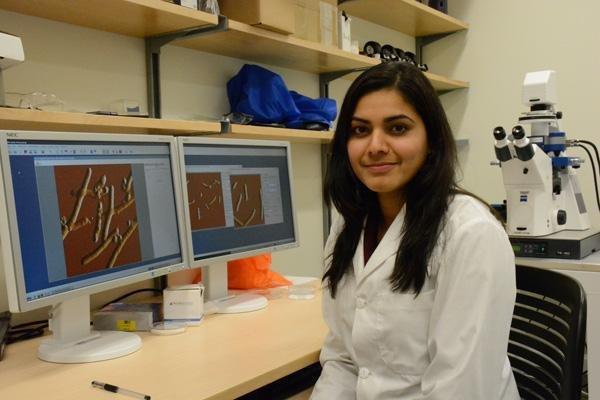Professor Tanya Dahms leads a research group in the Faculty of Science at the University of Regina in Saskatchewan, Canada. They seek to systematically characterize the structural, chemical and physical properties of outer surfaces (i.e. cell membranes and walls) as a function of internal biochemical factors and in response to external stimuli, to help elucidate their role as a sensing organelle or "sensosome". They also develop advanced microscopic methods to probe cell surfaces (microbes, plants and human cells) to complement traditional biochemical techniques.
Towards these goals, Professor Dahms’ team is developing: a) more detailed models that describe the surfaces of selected microorganisms and human cells by characterizing their ultrastructure, chemical and physical properties using optical, electron and atomic force microscopy, and b) in vitro high-content assays using correlative microscopy to assess the sub-lethal effects of xenobiotics (i.e. antifungals, pesticides etc.) on microbes and human cells. In the long-term, their aim is to enhance their understanding of how cell surfaces function and their role in first line responses to external stimuli that ultimately alter cellular function.
Professor Dahms talks about her choice of JPK’s NanoWizard® AFM system. ‘‘My group has successfully applied AFM for over fifteen years. The new technology of the NanoWizard® easily integrates with optical microscopes, in particular our Zeiss 780 laser scanning confocal microscope. This allows us to do correlative microscopy on live cells in real time. We have recently demonstrated proof-of-principle tricolour mapping and simultaneous quantitative imaging (QI™) of live, actively dividing E. coli, C. albicans and HEK 293 cells in response to the herbicide 2,4-dichlorophenoxyacetic acid. This new AFM-QI-LSCM assay produces multiplexed data describing cell morphology and mechanics, surface adhesion and ultrastructure and the localization of multiple fluorescent macromolecules in real time. The assay of 2,4-D shows altered surface properties, internal molecular rearrangement and oxidative stress in all three model cells, demonstrating the broad applicability of the method to a variety of cell types. In future, we will be able to monitor the impact of a multitude of contaminants, alone or in combination, on disparate cell types.’’
Professor Dahms’ group have published extensively. A selection of recent papers featuring results from the NanoWizard® AFM are listed below. It is noted that the work on the correlative microscopy assay is currently ‘‘in revision.’’
For more details about JPK’s AFM systems and their applications for the materials, life & nano sciences, please contact JPK on +49 30726243 500. Alternatively, please visit the web site: www.jpk.com or see more on Facebook: www.jpk.com/facebook and on You Tube: http://www.youtube.com/….
References
Exposure to Sub-lethal 2,4-Dichlorophenoxyacetic Acid Arrests Cell Division and Alters Cell Surface Properties in Escherichia coli, Supriya V Bhat et al, Front. Microbiol., 01 February 2018. https://doi.org/…
Oxidative stress and metabolic perturbations in Escherichia coli exposed to sublethal levels of 2,4-dichlorophenoxyacetic acid, Supriya V Bhat et al, Chemosphere, Volume 135, September 2015, Pages 453-461, https://doi.org/…
Rhizobium leguminosarum bv.viciae3841 Adapts to 2,4-Dichlorophenoxyacetic Acid with "Auxin-Like" Morphological Changes, Cell Envelope Remodeling and Upregulation of Central Metabolic Pathways, Supriya V Bhat et al, PLoSONE10(4):e0123813. https://doi.org/…
JPK Instruments AG is a world-leading manufacturer of nanoanalytic instruments – particularly atomic force microscope (AFM) systems and optical tweezers – for a broad range of applications reaching from soft matter physics to nano-optics, from surface chemistry to cell and molecular biology. From its earliest days applying atomic force microscope (AFM) technology, JPK has recognized the opportunities provided by nanotechnology for transforming life sciences and soft matter research. This focus has driven JPK’s success in uniting the worlds of nanotechnology tools and life science applications by offering cutting-edge technology and unique applications expertise. Headquartered in Berlin and with direct operations in Dresden, Cambridge (UK), Singapore, Tokyo, Shanghai (China), Paris (France) and Carpinteria (USA), JPK maintains a global network of distributors and support centers and provides on the spot applications and service support to an ever-growing community of researchers.
JPK BioAFM | Bruker Nano GmbH
Am Studio 2D
12489 Berlin
Telefon: +49 (30) 670990 7500
Telefax: +49 (30) 670990 30
https://www.bruker.com/bioafm
Communications Manager
Telefon: +49 (30) 726243500
Fax: +49 (30) 726243999
E-Mail: bagordo@jpk.com
![]()
